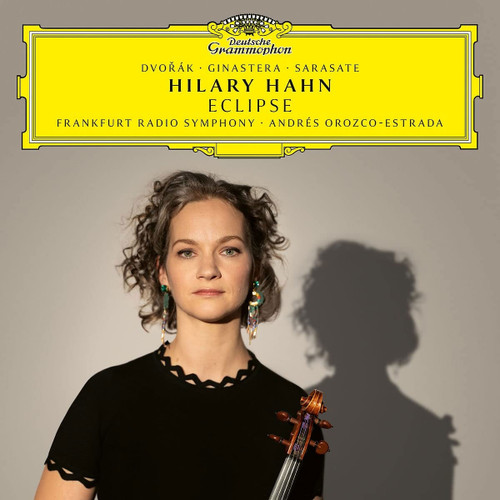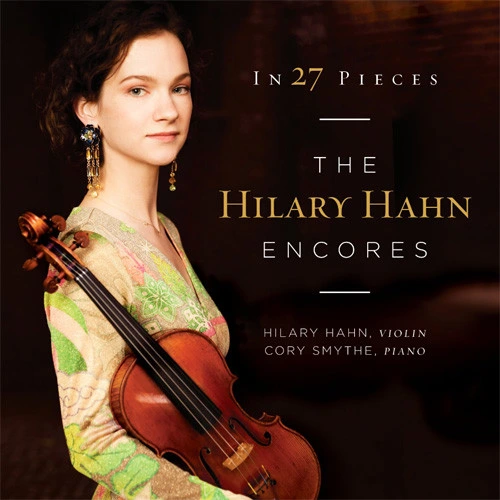Grammy-Winning Violinist on Double LP!
Featuring Dvorák's Spirited Violin Concerto, Ginastera's Rarely Performed Violin Concerto & Sarasate's Iconic Carmen Fantasy!
TAS Rated 3.5/5 Music, 4/5 Sonics in the March 2023 Issue of The Absolute Sound!
"This album is my return after an extended time out of the spotlight. It pays tribute to the humanity of music and the merging of meaningful collaborations." - Hilary Hahn
Hilary Hahn's 2022 album, Eclipse, celebrates the power of authenticity. Recorded with the Frankfurt Radio Symphony and its Music Director (2014-2021), Andrés Orozco-Estrada, it sees the triple Grammy-winning violinist deliver interpretations of three works charged with universal emotions yet rooted in their composers' musical heritage: Dvorák's Violin Concerto, a tour de force from the Czech composer's "Slavic period," Ginastera's Violin Concerto, a strikingly original 20th-century gem, and Sarasate's Carmen Fantasy, among the greatest virtuoso showpieces of all time.
"This recording tells stories I didn't understand until I returned to the stage after a long hiatus: the elation of coming into one's own, the declaration of an artistic identity, and what it means to regain your native language through music," says Hahn.
The album marks a series of musical milestones for the violinist. She has long loved the works it contains and discovered fresh insights and details of expression as she recorded each of them for the first time. Eclipse also reflects Hahn's close collaboration with the musicians of the Frankfurt Radio Symphony (in their home city and on tour) and her extensive partnership with Maestro Orozco-Estrada. Above all, it documents her return to recording, following a year-long sabbatical and many additional months of artistic solitude.
Hahn experienced intense personal evolution during her time away from the stage. After waves of canceled concerts and extended solo preparation, she arrived in Frankfurt for the live-stream of Dvorák's Violin Concerto, unsure of where her playing would lead her. With Orozco-Estrada and the Frankfurt musicians, Hahn returned to her truest form of expression, performing. In isolation, she realized, her musical identity had strengthened rather than waned. "When I got onstage for the Dvorák in April last year," she recalls, "it was like a jolt of life, as if the world came rushing back in Technicolor." Hahn and the Frankfurt Radio Symphony gave their first post-lockdown concert together in front of an audience two months later, during which their Ginastera and Sarasate performances were recorded live.
Alongside the joy of once again working with fellow artists, Hilary Hahn was captivated by the unique qualities of the works on Eclipse. All three composers featured on the album spent extended periods away from home - Dvorák and Ginastera in the United States, Sarasate almost permanently on tour - but remained in touch with their cultural roots even as they developed their own unique and multi-layered artistic voices.
Dvorák, a village butcher's son raised in central Bohemia, incorporated the folk songs and dances he had heard as a boy in his mature musical language in defiance of the Austro-Hungarian Empire's suppression of Czech culture and language. The Violin Concerto in A minor, Op.53, written between 1879 and 1882 for the great virtuoso Joseph Joachim, weaves folk-inspired themes typical of Dvorák's Slavic period into the classical forms of sonata and rondo. It concludes with a stylized version of the furiant, a fiery Czech dance, part of what Hahn calls "a gigantic statement of human emotion."
Ginastera's Concerto was commissioned by the New York Philharmonic and first performed by them and Ruggiero Ricci under the direction of Leonard Bernstein at the newly-opened Lincoln Center in 1963. A native of Buenos Aires, Ginastera made his name in the United States during the 1950s with works that combined elements of traditional Argentinian music and edgy modernism. His Violin Concerto, composed during the chaotic years between Juan Perón's 1955 deposal and the military coup of 1966, explores the infinite possibilities of variation within the form: Ginastera introduces a multitude of themes in its breathtaking opening solo cadenza and transforms them across three intricately crafted, absorbingly complex movements for violin and orchestra. The central Adagio is notable for turning the spotlight on the principal players of the orchestra, as well as the soloist. "I've been obsessed with the Ginastera for years," notes Hahn. "It's tantalizing and magical and weird. It's a mix of all of the rawest feelings you can have as a human being, but in a format that is pure genius."
Violinist-composer Pablo de Sarasate, born in Pamplona, gave the premiere of his hugely demanding Carmen Fantasy in Paris in 1883. The dramatic hit tunes of Bizet's Carmen, a tragic tale of love and jealousy set in southern Spain, supplied Sarasate with the themes for a series of richly decorated episodes that distill the essence of the opera and its charismatic heroine. "My emphasis in this interpretation is to make the piece operatic, so you can imagine hearing the words and the story they tell," comments Hahn. "It was a joy to work on it in Frankfurt with my wonderful colleagues."
"I feel with this album like we made something powerfully beautiful together during a difficult time," she adds. "When we played the final note of the Carmen Fantasy, I felt like I'd gone through a huge shift of perspective, through something really challenging, and emerged stronger as a person and a musician." She compares this shift to the return of light that always follows an eclipse. "Artistic evolution can come from many sources, but it often comes from a big event. I am so happy that I can share this pivot, this landing, this merging of voices in the global language of music."
She is best known as a Bach specialist, and if she delivers rather Bachian readings of Dvorák, Ginastera, and Sarasate, well, that is not a bad thing (and neither is the utterly diverse nature of the program). The Ginastera is delivered with steely perfection, and while one may be taken aback to hear Sarasate that is not over the top in the 19th century virtuoso manner, Hahn's reading is an elegant and entirely valid one. Her rapport with conductor Andrés Orozco-Estrada and the Frankfurt Radio Symphony is palpable. Whatever mid-career blues Hahn may have experienced, they are hard to detect in the finished product here.
Alberto Ginastera's Violin Concerto (1963) is tough, imposing, and deadly serious, but not grating like many twelve-tone pieces. It declaims its angst and tragedy without apology, but there are places to catch a breath. Hahn shines in it, from the strenuous solo opening, through the mysticism of the slow movement, and into the percussion-filled Scherzo and the furious Perpetuum Mobile. The Frankfurt musicians excel, too, adding their own intensity and atmosphere. Dvorak's Violin Concerto is underplayed compared to other romantic concertos; that is puzzling, gorgeous, and tuneful as it is. Hahn brings loneliness to the Adagio and a Vivaldi-spring-like joy to the finale. She's at least equal to Josef Suk and Karel Ancerl, and DG easily bests Supraphon's sonics. DG's LP has better-than-CD sound, and the Ginastera gets its own single LP.
Features
- Double LP
- Gatefold Jacket
- Made in Germany
Musicians
| Hilary Hahn | violin |
|---|---|
| Frankfurt Radio Symphony | |
| Andrés Orozco-Estrada | conductor |
Selections
LP 1 - Side A:
Antonín Dvořák (1841-1904)
Violin Concerto in A minor op. 53
- I. Allegro ma non troppo - Quasi moderato - attacca
- II. Adagio ma non troppo
LP 1 - Side B:
- III. Finale. Allegro giocoso, ma non troppo
Pablo de Sarasate (1844-1908)
Carmen Fantasy op. 25
- Introducción. Allegro moderato
- I. Moderato
- II. Lento assai
- III. Allegro moderato
- IV. Moderato
LP 2 - Side A:
Alberto Ginastera (1916-1983)
Violin Concerto op. 30
I. Cadenza e Studi
- Cadenza -
- Studio I: Per gli accordi. Allegro -
- Studio II: Per le terze. Allegretto -
- Studio III: Per gli altri intervalli. Lo stesso tempo -
- Studio IV: Per l'arpeggiato. Lo stesso tempo -
- Studio V: Per gli armonici. Andante -
- Studio VI: Per i 24 quarti di tono. Larghissimo -
- Coda. Maestoso
LP 2 - Side B:
- II. Adagio per 22 solisti
III. Scherzo pianissimo e Perpetuum mobile - Scherzo pianissimo. Sempre volante, misterioso e appena sensibile
- Perpetuum mobile. Agitato ed allucinante




 Turntable Accessories
Turntable Accessories Headphone Accessories
Headphone Accessories Cable Accessories
Cable Accessories Vinyl Accessories
Vinyl Accessories Compact Disc Accessories
Compact Disc Accessories









